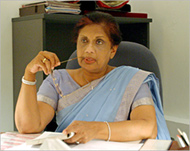Killings mar Sri Lanka peace hopes
Three men have been shot dead in Sri Lanka, bringing the death toll from a fresh wave of violence to 10.

The killings come amid diplomatic moves to end a deadlock in the island’s peace bid.
Officials said the three men were gunned down in separate incidents overnight on Monday and early Tuesday in the country’s east.
The military described the deaths as an upsurge in rebel internecine clashes. Seven had been killed on Saturday.
“We are noticing an increase in clashes,” military spokesman Daya Ratnayake said. “The indications are that this killing cycle will continue as both factions try to demonstrate their strength.”
The de facto number two in the Liberation Tigers of Tamil Eelam (LTTE) led an unprecedented split in March last year, and since then the main rebel outfit has been trying to retake control over the east where the renegades are active.
The LTTE has accused the security forces of colluding with the breakaway group of V Muralitharan, better known as Karuna, an allegation rejected by the government.
Direct threat
Scandinavian truce monitors said in a statement that the violence was a “direct threat” to the ceasefire in place since 23 February, 2002 and condemned the killings as “barbaric and cowardly”.
 |
|
Kumaratunga has called for face- |
“The violence has raised serious fears and created uncertainity, not only in the East, but also in the whole of Sri Lanka, and is preventing Sri Lankans from living a peaceful life,” the Norwegian-led truce monitors said.
The latest killings came as Sri Lanka asked the European Union to urge Tamil Tiger rebels to return to peace negotiations, officials said.
President Chandrika Kumaratunga told the visiting EU Commissioner for External Relations, Benita Ferrero-Waldner, to put pressure on the LTTE to return to the peace talks suspended since April 2003.
Ferrero-Waldner travelled to the island’s east on Tuesday to inspect EU-funded tsunami relief work, but did not meet with Tiger officials, an EU delegation office spokeswoman said.
Her visit comes after peace broker Norway failed in another attempt to salvage the faltering peace initiative and to get both the Tigers and Colombo to agree to jointly distribute foreign tsunami relief.
Tsunami shock
Diplomats close to the peace process said they had expected a breakthrough in setting up a “joint mechanism” to handle millions of dollars in foreign relief aid, but that appeared to have suffered a blow with the upsurge in killings.
|
“The violence has raised serious fears and created uncertainity, not only in the East, but also in the whole of Sri Lanka, and is preventing Sri Lankans from living a peaceful life” Statement by Norweigan peace monitors |
Kumaratunga’s office said she was “optimistic” that the planned joint mechanism to rebuild the lives of the victims would “enhance the prospects of recommencing direct negotiations and building confidence among the people”.
Face-to-face talks between the government and Tamil rebels have been on hold since April 2003, but both sides have agreed to honour the ceasefire.
Nearly 31,000 people were killed and a million left homeless on the island in the aftermath of the 26 December tsunami. Two thirds of the victims were in the embattled northern and eastern regions, much of which is held by the Tigers.
Sri Lanka has been wracked by civil war for 20 years in a conflict that has claimed more than 60,000 lives.